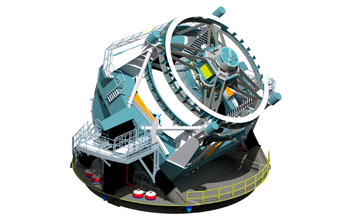News Release 12-137
National Science Foundation Will Advance the Large Synoptic Survey Telescope
July 18, 2012
This material is available primarily for archival purposes. Telephone numbers or other contact information may be out of date; please see current contact information at media contacts.
With approval from the National Science Board, the National Science Foundation (NSF) Director will advance the Large Synoptic Survey Telescope (LSST) to the final design stage. This action permits the NSF Director to include funds for LSST construction in a future budget request. To be located in Chile, the LSST is a proposed 8-meter wide-field survey telescope that will survey the entire sky approximately twice per week, delivering a large and comprehensive data set that will transform astronomical research.
The LSST was the first-ranked ground-based large initiative in the 2010 National Academy of Sciences decadal survey in astronomy and astrophysics. The project is a partnership among the NSF, the Department of Energy (DOE) and a number of private contributors.
"LSST will provide an unprecedented view of the sky while leading the emerging discipline of data-enabled science," said NSF Director Subra Suresh. "The project will foster international collaboration and offer unique methods for discovery in this new age of Big Data."
Equipped with a 3-billion pixel digital camera, the LSST will propel astronomy ever further into the era of data-enabled science. By charting objects that change or move, and tracing billions of remote galaxies, LSST will provide multiple probes of the mysterious dark matter and dark energy, provide insight into short-lived transient events such as astronomical explosions or collisions, and create a more detailed map of the Milky Way and our own solar system.
"LSST will transform how scientists detect and analyze astronomical events," said Edward Seidel, assistant director for the NSF's Mathematical and Physical Sciences Directorate. "The potential to deepen our understanding of the universe and its constituents, from distant exploding stars to nearby asteroids, is enormous."
NSF and DOE have recently signed a formal Memorandum of Understanding delineating the scope of the agencies' responsibilities throughout the lifetime of the project. NSF will be responsible for development of the site and telescope, as well as the extensive data management system. DOE, through a collaboration led by its SLAC National Accelerator Laboratory, will be responsible for development and delivery of the large-format camera. The Republic of Chile, through an agreement with Universidad de Chile, will make available the observing site for the LSST telescope.
The total construction cost of LSST is estimated to be about $665M, approximately 70 percent from NSF, 24 percent from DOE, and 6 percent from private donors to the project. The construction is anticipated to last five years, followed by a two-year commissioning period before the start of the survey.
-NSF-
Media Contacts
Lisa Van Pay, NSF, (703) 292-8796, email: lvanpay@nsf.gov
Program Contacts
Nigel A. Sharp, NSF, (703) 292-4905, email: nsharp@nsf.gov
The U.S. National Science Foundation propels the nation forward by advancing fundamental research in all fields of science and engineering. NSF supports research and people by providing facilities, instruments and funding to support their ingenuity and sustain the U.S. as a global leader in research and innovation. With a fiscal year 2023 budget of $9.5 billion, NSF funds reach all 50 states through grants to nearly 2,000 colleges, universities and institutions. Each year, NSF receives more than 40,000 competitive proposals and makes about 11,000 new awards. Those awards include support for cooperative research with industry, Arctic and Antarctic research and operations, and U.S. participation in international scientific efforts.
Connect with us online
NSF website: nsf.gov
NSF News: nsf.gov/news
For News Media: nsf.gov/news/newsroom
Statistics: nsf.gov/statistics/
Awards database: nsf.gov/awardsearch/
Follow us on social
Twitter: twitter.com/NSF
Facebook: facebook.com/US.NSF
Instagram: instagram.com/nsfgov



